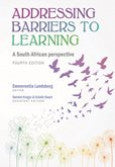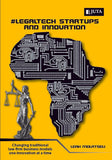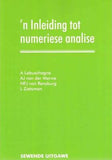
Addressing barriers to learning - A South African perspective 4/e (e-book)
Addressing barriers to learning covers the complete continuum of barriers to learning as reflected in Education White Paper 6, including the most vulnerable of them: those who are economically and educationally disadvantaged; those with physical, sensory, intellectual, and/or learning impairment; those who are subjected to xenophobic behavior and those displaying challenging behavior who are at risk of exclusion. This latest edition also includes a new section on discrimination and sociocultural injustice towards LGBTQI (lesbian, gay, bisexual, transgender, queer, questioning and intersex) learners. Case studies offer practical examples and activities provide opportunities for hands-on experience with classroom practice and management, collaboration with all role players and mobilization of community involvement, which is at the heart of true inclusion.
| eISBN: | 9780627036507 |
|
Author(s):
|
Landsberg E, Krüger D, Swart E |
|
Variant:
|
e-book |
| Van Schaik Publishers (ePub) | |
| Edition: | 4th Edition |
| Pages: | 624 |
| Published: | 2019 |
SECTION A INTRODUCTION
Chapter 1 A framework for understanding inclusion
Chapter 2 Legal and ethical considerations for barrier-free education
SECTION B ADDRESSING SOCIOECONOMIC BARRIERS
Chapter 3 Socioeconomic barriers to learning
SECTION C ADDRESSING EDUCATIONAL BARRIERS
Chapter 4 Identification and assessment of barriers to learning
Chapter 5 Learning support
Chapter 6 Early childhood development and intervention
Chapter 7 Addressing life skills challenges
SECTION D ADDRESSING LITERACY BARRIERS
Chapter 8 First language: challenges in spoken language
Chapter 9 Literacy: challenges in reading, writing and spelling
Chapter 10 Second-language difficulties in a South African context
Chapter 11 Augmentative and alternative communication
Chapter 12 Challenges in mathematics: mathematical literacy and numeracy
SECTION E ADDRESSING ATTITUDE BARRIERS
Chapter 13 Family and community partnerships
Chapter 14 Xenophobia
SECTION F ADDRESSING DISABILITY
Chapter 15 Orientation: neurology in an educational perspective
Chapter 16 Physical impairment
Chapter 17 Epilepsy
Chapter 18 Cerebral palsy
Chapter 19 Skeletal and muscular impairment
Chapter 20 Autism spectrum disorder
Chapter 21 Visual impairment
Chapter 22 Educating the deaf and hard-of-hearing learner
Chapter 23 Learning impairment and attention-deficit hyperactivity disorder (ADHD)
Chapter 24 Intellectual impairment
Chapter 25 Severe disabilities
SECTION G ADDRESSING HEALTH IMPAIRMENT
Chapter 26 Health impairments and conditions in children
SECTION H ADDRESSING CHALLENGING BEHAVIOUR
Chapter 27 Addressing challenging behavior in the classroom
SECTION I ADDRESSING GIFTEDNESS
Chapter 28 Addressing giftedness
We Also Recommend




